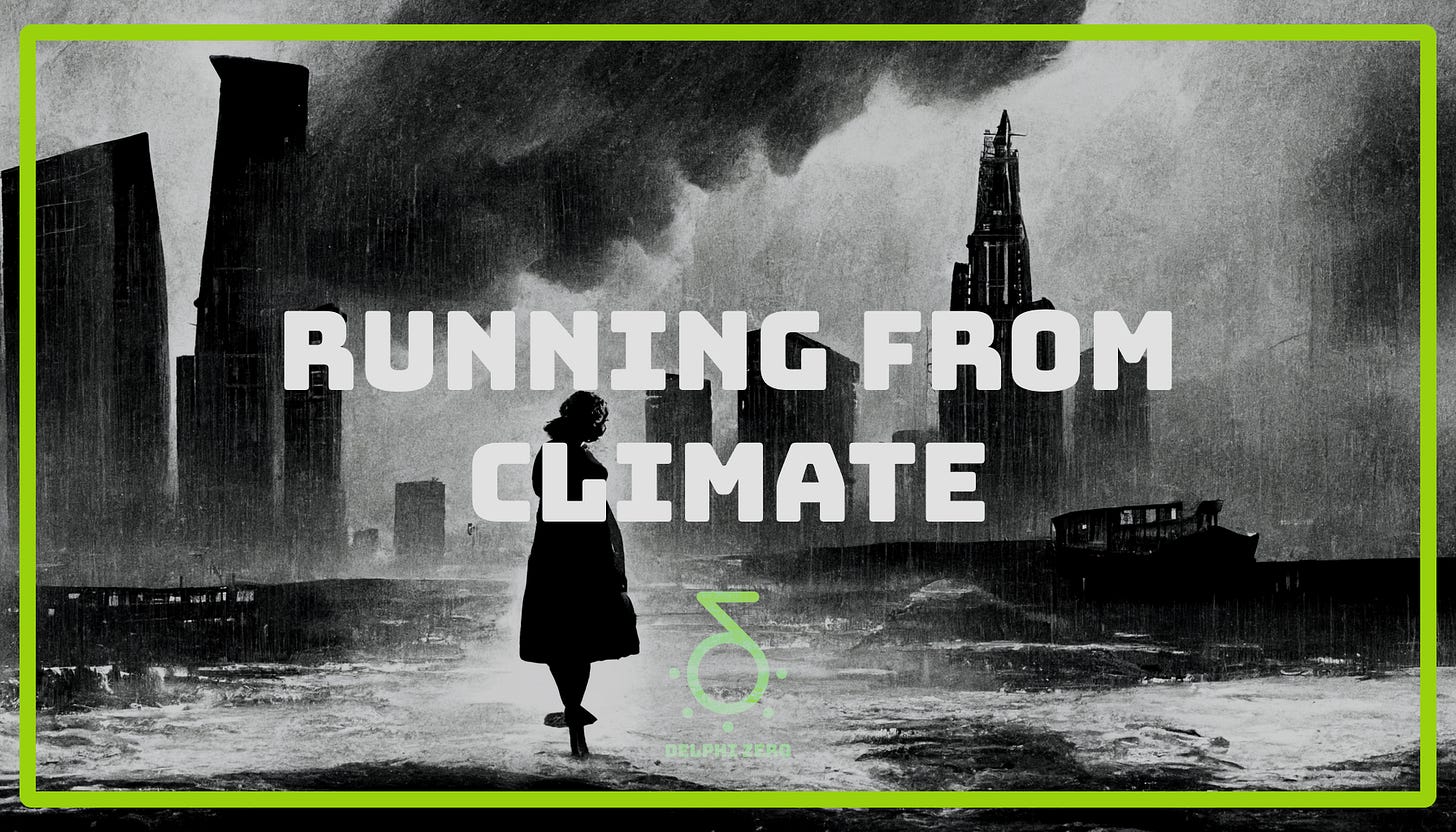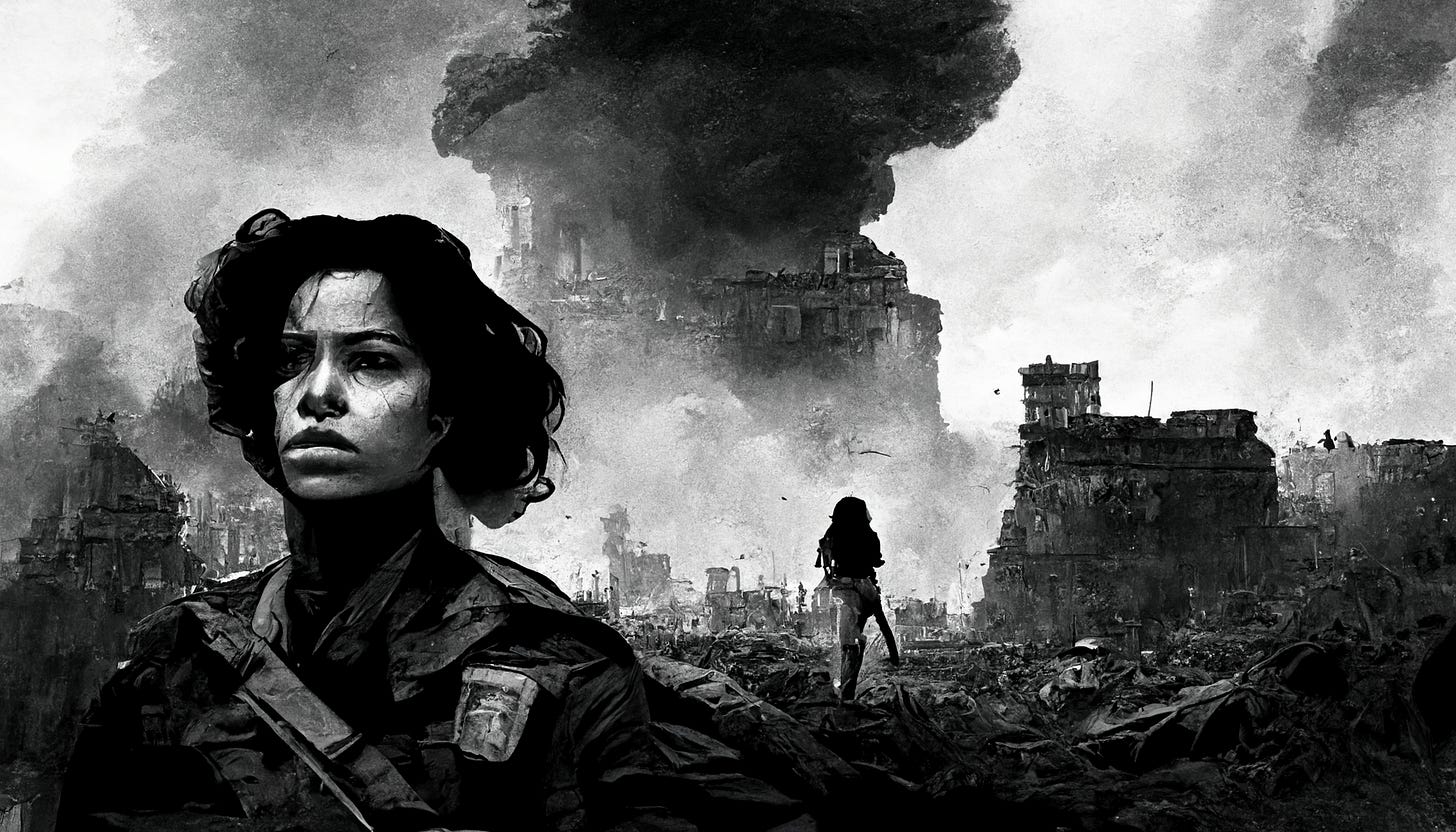Running from Climate
Where is home if you don’t remember how home feels?
👋 Heya to 61 new readers who joined recently! We are 483 climate buddies now 🌳
I wanted to write about climate refugees, and the only way I could do it was as a climate sci-fi short.
This essay is super experimental and very different from the other ones. I hope you’ll like it.
Running from Climate
By Art Lapinsch (images generated via Midjourney)
Shock
It all started with a pregnant woman on the run.
Isabella’s mother had traveled far and wide. Not because she chose to but because she had to.
Climate’s angry fist was tightening with every year, and the habitable zones shrank by the month. Migration became a matter of life and death.
First, it was the poor and forgotten. Eventually, it affected most of us. That’s when newscasters stopped designating natural disasters with silly names like “Jasper” or “Martyna.”
The time of diminutives was over.
Isabelle’s mother tried to survive. Not physically but emotionally. Something primal in her brain compartmentalized all the impressions and started to detach her from the painful experiences.
When Isabella was old enough, she started asking all sorts of questions:
Where did we come from?
Why did we leave?
What’s next?
Yet a truly naive question ended it all: “Why did we travel alone?”
Something about this question broke her mother. Isabella didn’t understand back then. But years later, she remembered that they embarked as a group of three.
Denial
As a teenager, Isabella grew up in an industrial city, which had already seen its best days.
The general mood was gloomy yet stable. At least they had a place to live. Work was difficult to come by since the primary industry had moved further inland. Curfews were the norm, and electricity got curtailed to save the limited energy at hand.
The wasted youth just saw these as rules to be tested. It so happened that Isabella got involved with the wrong crowd. It was not the one she asked for but the one she deserved.
Her nights out interfered with her education. When she should have been learning, she was daydreaming about the next bender.
It didn’t help with her academic aspirations, but it helped to cope with reality.
Anger
Isabella was angry at herself.
Her family had been through so much to give her a fighting chance. And what did she do? She tossed that opportunity right into the bin. Was that worth it? She didn’t know.
With her poor grades, she was no longer eligible for the scientific track, yet the world was on fire, and there was enough work to do. She had to redeem herself, and enlisting in the national guard seemed like the right thing to do.
In most countries, national guards have seen a massive transformation - from reserve units to permanent disaster relief specialists. In her country, this meant being the first responder when yet another community had been devastated. Week in, week out.
Her anger was fueling her desire to do good. At least, that’s what she believed at first.
Bargaining
All the hours, all the strain, all the sacrifice had to be worth it. Right?
She lost count of the people who had thanked her for saving their lives.
Yet, she hadn’t lost count of the people she had lost in her hands. It was way too many.
The years of service started rubbing off on Isabella. Initially, she believed her time at the national guard was proper atonement for her sins. But the longer she served, the more she grasped the darkness around her.
What she wanted was an escape from pain. What she got instead was a hard look at it.
Depression
The service at the national guard exposed her to catastrophe regularly.
She was one of the strongest in her group, but she was human after all. The destruction, the suffering, and the lack of hope caught up to her. She had been pushed over the edge. Just like her mother many years earlier. She had reached her breaking point.
Darkness was all-encompassing. The good episodes were few and far between.
Isolation led to anxiety, anxiety led to dread, and dread led to dark thoughts.
Where is home if you don’t remember how it feels?
What is the meaning of life if you don’t know what it’s for?
Fortunately, Isabella had a fellow serviceman who cared for her. He listened when asked to. He spoke his mind when needed. And most importantly, he arranged for professional help.
There was still a chance.
Reconstruction
Everyone struggles in their way, yet the lucky ones always manage to struggle out of the darkness.
Many things could have made the difference for Isabella, but for whatever reason, her mind responded to the fact that no one can change circumstances, but everyone can try to control how they respond.
One thing is in your control. The other one isn’t.
Eventually, she realized that she wasn’t running from climate. She was running from herself.
This realization broke the dam and untangled the knot. All at once.
She cried tears of sorrow for an old life lost.
She cried tears of joy for a new life won.
Belief
Years later, Isabella was still helping people to run from climate. But at least she didn’t run from herself.
She frequently remembered the days when she and her mother had just escaped Florida into Georgia. Her first memories as a young girl used to fill her with anxiety and anger. Now she understood that it was the making of her mythology. A climate refugee with a past in the south and a calling in the north.
First, as a soldier. Then, as a Special Envoy. And ultimately, as the first Field Operative at G.E.C.O.’s special operations program.
Word traveled faster than destruction, and so Isabella’s service became the stuff of legends.
She became the Icon of the South.
Everyone is running from something. But if we’re lucky, really lucky, fate intervenes and presents an opportunity to conquer our fears. Only then, if triumphant, can a destiny bestowed become a destiny fulfilled. - Rome Sims
🙏 Thanks, Sara, Tim, and Chris, for discussing and editing.
This essay was an expansion of the G.E.C.O universe. You might recognize the main character from the appendix of the initial story.
If you enjoyed this essay, please consider forwarding it to a friend who wants to get started with climate 🌳
If you have feedback/ideas/critique/etc., please let me know how I can improve.
The coolest thing by far is when I get to interact with readers 1:1.
A couple of weeks ago - I believe after the “Carbon Taxi Time Machine” essay - Ben reached out to me, and we started talking. Eventually, we met up, had the best kebab in Berlin, and walked for hours to discuss climate, technology, and music. It was awesome and is the best payoff for writing this newsletter 🙌
Damn, if someone had told me a couple of months ago that by November, I’ll reach close to 500 climate-curious people, I would have said: “Yeah, sure, buddy!” But here we are. Massive thanks to everyone who decided to read this newsletter 🙏
It means a ton to me, and I’m still blown away by the responses (like Ben’s) I get every once in a while.














